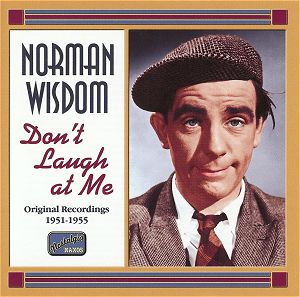 CD Reviews
CD Reviews MusicWeb
Webmaster: Len Mullenger
Len@musicweb.uk.net
[Jazz index][Purchase CDs][ Film MusicWeb][Classical MusicWeb][Gerard Hoffnung][MusicWeb Site Map]

Norman Wisdom
Don't Laugh at Me
rec. 1951-55
![]() NAXOS NOSTALGIA
8.120858 [57:07]
NAXOS NOSTALGIA
8.120858 [57:07]
Trouble In Store: I'd Like To Put On Record (That I Love You, Love You, Love You)
London Melody
Where's Charley: Once In Love With Amy
Beware
Trouble In Store: Don't Laugh at Me
Narcissus, "The Laughing Song" *
The Heart Of A Clown
My Little Dog (Where's He Gone)
Young At Heart
Just To Be With You
They Didn't Believe Me
You Were Meant For Me
So Nice To Dream
One Good Turn: Please Opportunity
One Good Turn: Take A Step In The Right Direction
I'll Always Love You
Boy Meets Girl **
Impossible
Two Rivers **
I Don't 'Arf Love You *
Norman Wisdom with
Joyce Grenfell *
Ruby Murray **
With orchestral accompaniment
Curious chap, Norman Wisdom; big in Albania, but a bit of a puzzle to his compatriots. Still rudely alive at the time of writing he knocks about a bit – turning up to celebrate the unveiling of Max Miller statues and the like. And his films still get the occasional airing though I suppose his askew cloth cap and drippy persona is considerably less amusing now than it once was. Spivs like Max Miller don’t date but clowns do.
Some of the songs on this new compilation now sound dated but for very precise reasons. His very proper BBC pronunciation will come as a surprise in I'd Like To Put On Record (That I Love You, Love You, Love You) as will the yucky Americanised backing vocalists, who complete a thoroughly incompatible number. In the Robert Farnon song London Melody Wisdom deals with the rather lugubrious business in "straight" style and that air of lugubriousness also afflicts his theme song, Don't Laugh at Me which he sings in a rather suave baritone. He and Joyce Grenfell do their famous patter on The Laughing Song and I prefer it to the establishment of his put-upon self, redolent of saloon-bar croon and self-pity in The Heart Of A Clown.
Sometimes when he recorded for Philips he reverted to his Received Pronunciation accent, as in that piece of period fluff My Little Dog (Where's He Gone) though he also added some quasi-transatlantic sheen when necessary – try Take A Step In The Right Direction. He was clearly seeking a more sophisticated direction himself at this point because I'll Always Love You has a surface sheen to it that was auguring for the mainstream. We also have his forced cross-talk duets with Ruby Murray, an acquired taste.
Stylistically Wisdom’s 1951-5 sides show an alarming veer from popular croon, to comedy patter, film song suavity, matinee idol repertoire, and forced bonhomie. It means the tone of the disc is necessarily uneven – but then that’s how it was for Wisdom and the album faithfully reflects the fact. Good transfers and notes.
Jonathan Woolf